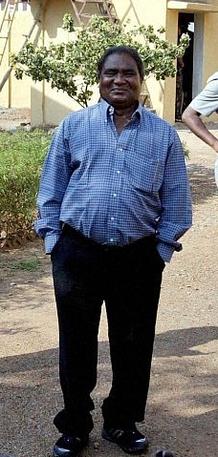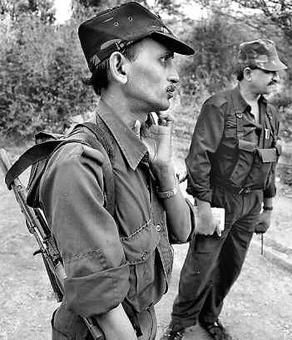
The Communist Party of India (Maoist) is a banned Marxist–Leninist–Maoist communist political party and militant organization in India which aims to overthrow the "semi-colonial and semi-feudal Indian state" through protracted people's war. It was founded on 21 September 2004, through the merger of the Communist Party of India (Marxist–Leninist) People's War (People's War Group) and the Maoist Communist Centre of India (MCCI). The party has been designated as a terrorist organisation in India under the Unlawful Activities (Prevention) Act since 2009.

Mahendra Karma was an Indian political leader belonging to Indian National Congress from Chhattisgarh. He was the leader of the opposition in the Chhattisgarh Vidhan Sabha from 2004 to 2008. In 2005, he played a top role in organising the Salwa Judum movement against Naxalites, a Maoist group in Chhattisgarh. He was a Minister of Industry and Commerce in the Ajit Jogi cabinet since the state formation in 2000 to 2004. He was assassinated by Naxalites on 25 May 2013 in the 2013 Naxal attack in Darbha valley while returning from a Parivartan Rally meeting organised by his party in Sukma.
Kondapalli Seetharamaiah was a senior communist leader and Maoist organizer in India.

The Naxalite–Maoist insurgency is an ongoing conflict between Maoist groups known as Naxalites or Naxals and the Indian government. The influence zone of the Naxalites is called the red corridor, which has been steadily declining in terms of geographical coverage and number of violent incidents, and in 2021 it was confined to the 25 "most affected" locations, accounting for 85% of Left Wing Extremism (LWE) violence, and 70 "total affected" districts across 10 states in two coal-rich, remote, forested hilly clusters in and around the Dandakaranya-Chhattisgarh-Odisha region and the tri-junction area of Jharkhand, Bihar, and West Bengal. The Naxalites have frequently targeted police and government workers in what they say is a fight for improved land rights and more jobs for neglected agricultural labourers and the poor.

Patel Sudhakar Reddy, aliases Suryam, Damodar, and Venkatesh, was a leader of the central committee of the Communist Party of India (Maoist).
Mallojula Koteswara Rao, commonly known by his nom de guerreKishenji, was an Indian political leader who was a Politburo and Central Military Commission member of the Communist Party of India (Maoist), a banned revolutionary organization in India; and also the party's military leader. He was seen as "The Face of the Maoism in India".
The April 2010 Dantewada Maoist attack was an 6 April 2010 ambush by Naxalite-Maoist insurgents from the Communist Party of India (Maoist) near Chintalnar village in Dantewada district, Chhattisgarh, India, leading to the killing of 76 CRPF policemen and 8 Maoists — the deadliest attack by the Maoists on Indian security forces.

Greyhounds is a police special forces unit of the Andhra Pradesh and Telangana Police departments in India. Greyhounds specialises in counter-insurgency operations against Naxalite and Maoist terrorists.
Prashant Bose, commonly known by his nom de guerre Kishan or Kishan da is an Indian politician who is a senior Politburo member of the Communist Party of India (Maoist). He has previously used Nirbhay Mukherjee, Kajal, Kishan-da and Mahesh as aliases. Kishan, the former MCCI chief is now No. 2 in the CPI (Maoist). He is in charge of Bihar and Jharkhand and heading the Party's Eastern Regional Bureau. And this Bengali Maoist leader, 74 in age is also a known intellectual of the party. He joined in Naxalite movements as a trade union activist in 1967 and continued to play a key role in Left-wing politics in India.
Cherukuri Rajkumar was an Indian politician who was the spokesperson and one of the seniormost members of the Central Politburo of the banned Maoist group Communist Party of India (Maoist). On 1 July 2010, he was killed by Andhra Pradesh Police in an encounter.

Soni Sori is an Adivasi school teacher turned political leader of Aam Aadmi Party in Sameli village of Dantewada in south Bastar, Chhattisgarh, India. She was arrested by the Delhi Police's Crime Branch for Chhattisgarh Police in 2011 on charges of acting as a conduit for Maoists. During her imprisonment, she was tortured and sexually assaulted by Chhattisgarh state police. By April 2013, the Indian Courts had acquitted her in six of the eight cases filed against her due to lack of evidence. After release from prison, Sori began campaigning for the rights of those caught up in the conflict between Maoist insurgents and the government, in particular criticising police violence against tribespeople in the region.
Narmada was an Indian politician who was one of the "senior-most" female cadres of the Communist Party of India (Maoist), a banned Maoist insurgent communist party in India. She was a Central Committee member of the party, and reportedly used to frame "all policies for the female cadre of Maoists."
Katakam Sudarshan, commonly known by his nom de guerre Anand, was an Indian politician who was a Politburo member of the Communist Party of India (Maoist), a banned Maoist insurgent communist party in India.
Kadari Satyanarayan Reddy, commonly known by his nom de guerre, Kosa, was an Indian politician who was a Central Committee member of the Communist Party of India (Maoist), a banned Maoist insurgent communist party in India.
Krantikari Adivasi Mahila Sangathan is a banned women's organisation based in India. The Krantikari Adivasi Mahila Sangathan (KAMS) is a successor of the Adivasi Mahila Sanghathana (AMS). The foundation of the AMS was laid by the Maoists in 1986.
Rahul Pandita is an Indian author and journalist.
Chetna Natya Manch is the "Cultural Troupe" of the Communist Party of India (Maoist). Chetna Natya Manch is headed by Leng, and has more than 10,000 members.
Narayan Sanyal commonly known as Bijoy da and Naveen Prasad was a Maoist ideologue and a Politburo member of the Communist Party of India (Maoist). He was one of the earliest comrade of Naxal leader Charu Majumdar and member of undivided Communist Party of India (Marxist–Leninist). It is claimed that at the time of arrest Narayan Sanyal was next only to CPI (Maoist) the then general secretary Muppala Lakshmana Rao alias Ganapathy.
Nambala Keshava Rao, commonly known by his nom de guerre Basavraj or Gaganna, is an Indian Maoist politician and General Secretary of the Communist Party of India (Maoist), currently on NIA's list of most wanted absconders.
Sadanala Ramakrishna is an Indian Maoist politician, senior leader of Communist Party of India (Maoist) and head of the Central Technical Committee of the party.






